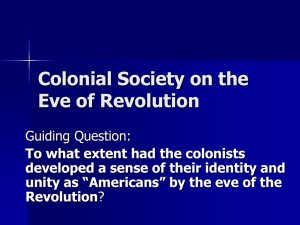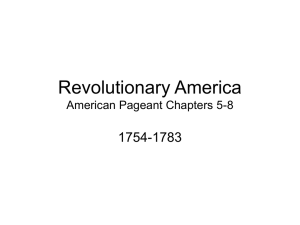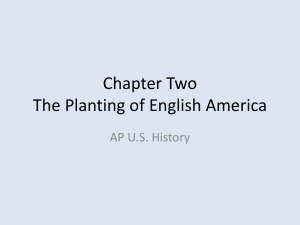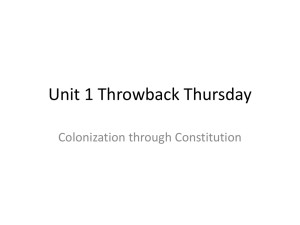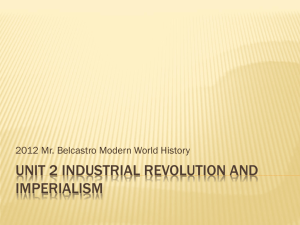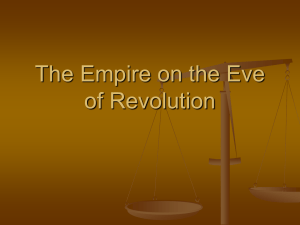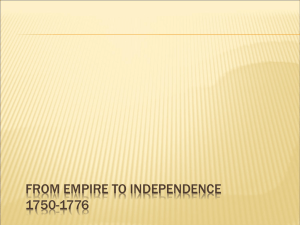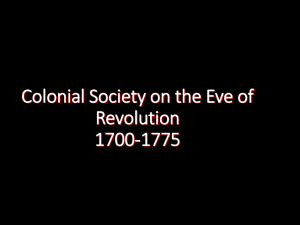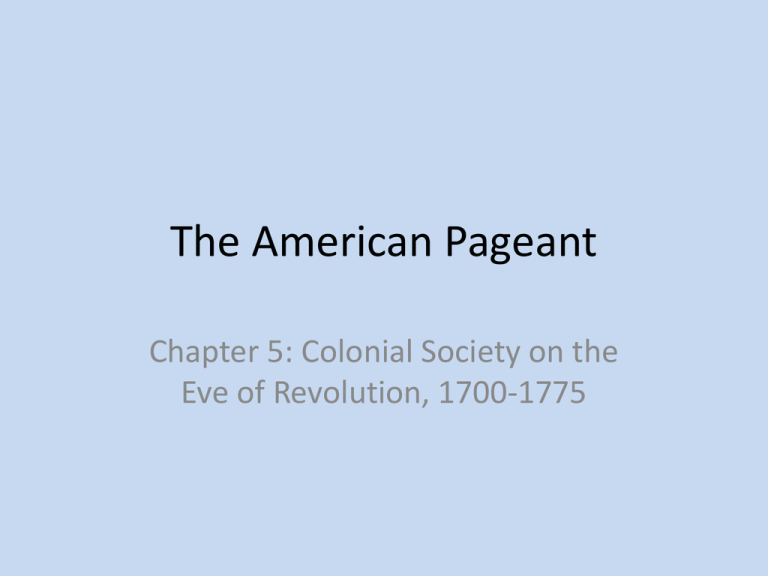
The American Pageant
Chapter 5: Colonial Society on the
Eve of Revolution, 1700-1775
Conquest by Cradle
• By 1775, 2.5 million people in the 13 Colonies
– Less than 300,000 in 1700
• Between 1700 and 1775, 400,000 white
immigrants and nearly 400,000 slaves
• Average age of colonists is 16 in 1775
• Ratio of English to colonists in 1700 is 20 to 1.
Down to 3 to 1 in 1775. Balance of power
shifting
• 90% of people live in rural areas. Only
Philadelphia, NYC, Boston, and Charleston are
“cities”
The Colonial Melting Pot
• By 1775…
– 6% of Colonists are German (mostly in PA, Protestant,
1/3 of PA population
– 7% Scots-Irish (Scots who had moved to Ireland then
to the colonies, mostly to PA)
• Spread out down to the Allegheny and Appalachian
Mountains into western MD, VA, and Carolinas
• No love for the British or any other government for that
matter
• 5% other European groups (French, Welsh, Dutch,
Swedes, Irish, Swiss, Scottish)
The Colonial Melting Pot
• South has 90% of colonial slaves
• Least ethnic diversity in New England, most in
the middle colonies.
• Outside of New England, half of the
population is non-English
• Michel-Guillaume Jean de Crèvecoeur quote
– “a strange mixture of blood, which you will find in
no other country”
– “What then is the American, this new man?”
Map 5.1: Immigrant Groups in 1775
Copyright © by Houghton Mifflin Company. All rights reserved.
5
Structure of Colonial Society
• Openness of the social ladder
– No titled nobility (lords, earls, etc.)
– No real underclass in white society
• Beginning to change in the 18th Century
– Wars during the 1690s and early 1700s made a
number of merchants in the middle colonies and
New England very rich
– By 1750, the richest 10% in Boston and
Philadelphia have 2/3 of the wealth
Structure of Colonial Society
• The poor
– Wars of the 1690s and early 1700s create widows
and orphans who become society’s dependents
– Farm sizes are shrinking drastically in New
England. No new land is available, so the land
already claimed is divided among families. Forces
people to move west to seek land or become
wage laborers
Society in the South
• Large-scale planters have a huge amount of
power because they own so many slaves
• Gap between wealthy planters and small
farmers/tenant farmers is growing
• Lower class also growing because of
indentured servants continuing to come to
America
Slavery Becoming an Issue
• Slaves had no equality, and no chance to
improve their social or economic status
• Some colonies attempt to restrict the
importation of slaves because of fears of slave
rebellions if their numbers grew too large
• The British vetoed all of these efforts because
of their desire for cheap labor for their
colonies, especially in the West Indies
Professions in the Colonies
• Clerics- most honored
• Doctors- Not looked highly upon
– Bleeding
– Epidemics were an everyday fear. Death of
thousands of children in the 1730s due to
diphtheria reminded many of their mortality
• Lawyers
– Not looked favorably upon at first
Working in the Colonies
• Agriculture
– The leading industry
– Tobacco in the Chesapeake colonies
– Grain in the bread (middle) colonies
– Diverse farming in New England
• Fishing was a big industry in New England, but
far below farming in the colonies
Triangular Trade
• Commercial trade was also big in the colonies
• Triangle Trade
– Leave New England with rum
– Trade rum for slaves in Africa
– Slaves for molasses in the West Indies
– Molasses to New England to be distilled into rum
• Also carried food and wooden products to the
Caribbean
Map 5.3: Colonial Trade Patterns, c. 1770
Copyright © by Houghton Mifflin Company. All rights reserved.
13
Manufacturing in the Colonies
• Smaller than most other industries, but some
manufacturing endeavors are taking off
– Rum distillation in Rhode Island and
Massachusetts
– Ironworks , like Valley Forge, found more
• Lumbering the most important manufacturing
– Lots of wood needed for shipbuilders
– 400 ships per year built by 1770
Map 5.2: The Colonial Economy
Copyright © by Houghton Mifflin Company. All rights reserved.
15
Economic Problem
• Growing population needs more British products
• Population in Britain growing very slowly, so they
are importing less American goods than we
export to them
• Have to seek out non-British markets to sell our
goods (French Islands in the West Indies a good
market)
• Molasses Act passed to try to stop trade between
colonies and West Indies
• Bribery and smuggling become a major problem
after this for the British
Connection in the Colonies?
• Roads in the 1700s are terrible
– Dust in the summer and mud in the winter
• Waterways the travel method of choice.
– Slow and dependent on the weather, but cheap
• Taverns (Another cradle of democracy)
– Social classes would mingle together in what was
a center of information in many colonial towns
• Postal system
– Service slow and mail didn’t run often, no secrecy
Denominations in the Colonies
• Two established churches in 1775: Anglican and
Congregational
• Anglican Church
– Prop of the crown’s authority in America
– Bad reputation of Anglican clergy. William and Mary
founded in 1693 to train better ones.
• Congregational Church
– Grows out of the Puritan Church.
– In all New England colonies except Rhode Island
• Ministers become political activists as revolution gets closer.Presbyterian, Congregational, and rebellion (The Rebellion
Trinity)
The Great Awakening
• New doctrines and more liberal membership
policies threatening the church
• Great Awakening is the revival in response in
the 1730s and 1740s
– Jonathan Edwards (1734)- Sinners in the Hands of
an Angry God- Need for complete dependence on
God’s grace
– George Whitefield- Toured the colonies starting in
1738. Great speaker, who preached human
helplessness and divine omnipotence
Effects of the Great Awakening
• Emphasis on direct, emotional spirituality
changed the church
• Number of churches increased by the divides
in denominations
• New missionary work among Native
Americans and slaves
• “New light” centers created like Princeton,
Brown, Dartmouth, and Rutgers
• First spontaneous mass movement of
Americans
Education
• New England most interested in education
– Needed to be able to read the Bible
– Education emphasis on good Christians rather than on
good citizens
– Established primary and secondary schools early as well
• Elementary schools also existed in the middle colonies and
South
• Emphasis is on religion and classical languages, not reason
and experiment
• Nine colleges established in the colonies- still focused on
theology and languages until the 1750s
The Arts and Culture in the
Colonies
• Artists had to go to London for training. Still
not a “American” art style
• Charles Wilson Peale- portraits of George
Washington
• People in the U.S. do not have the money or
leisure time to sit for portraits
• Architecture from Europe as well
Literature
• Phillis Wheatley
– Slave girl brought to Boston at age 8
– No formal education
– Taken to England at 20, and writes a book of verse.
– Poems on Various Subjects, Religious and Moral (1773)
• Benjamin Franklin
– “First civilized American”
– Poor Richard’s Almanack- Witty sayings that emphasized morality,
thrift, and common sense
– More widely read in America than anything except the Bible
– Best scientist produced in the early colonial times
– Lightning Rod, Bifocals, Franklin stove
Pioneer Presses
• 40 Colonial newspapers by 1775
– Ran weekly
• News typically lagged many weeks behind the event
• Good tool for airing colonial grievances and rallying British opposition
• John Peter Zenger case
– New York case- Zenger’s newspaper criticized the royal governor
– Charged with seditious libel
– Jury finds Zenger not guilty
– Huge moment for freedom of the press and democracy
– Open public discussion required in a diverse democratic society
– Precedent that true statements about public officials cannot be
prosecuted as libel
Colonial Politics
• 8 Colonies with royal governors, 3 with
proprietors who chose the governors, and 2
who were self-governing
• Two-house legislative body was typical
– Upper house appointed usually
– Lower house elected by the people with enough
property to qualify as voters
• Self-taxation through representation was a
huge deal to Americans.
Colonial Politics
• Colonial assemblies would withhold a
governor’s salary unless he yielded to the
legislature’s wishes. Usually worked
• Town-meeting gov’t in New England, county
gov’t in the South, a mix in the Middle
• Because of property and religious
requirements to vote in different areas, nearly
half of adult white males could not vote
• Not a true democracy by 1775, but more so
than anywhere in Europe

